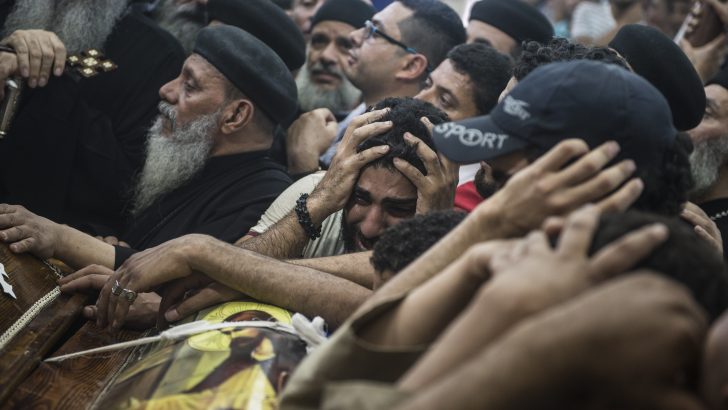Gamal Tawfiq, a Coptic Christian schoolteacher, was walking home from work when his killers struck on February 16. Having been stalked through the streets of el Arish, the largest city on Egypt’s Sinai Peninsula, Tawfiq was shot from a passing motorcycle, on which the killers then made their hasty escape.
The death of Tawfiq was the second shooting of a Christian in el Arish in less than a week. On February 12, a vet, Bahgat Zakher, was gunned down, another in a growing list of Coptic Christians murdered across Egypt, including another in el Arish back in January, that of a local shopkeeper murdered in his place of business.
To now, the raft of murders has been blamed by observers on separate and unknown killers, acting individually though bound by their intolerance of the minority Coptic community in their midst.
Strand
With Tawfiq’s killing however, security sources pointed to the dark hand of a group known today as the ISIS-Sinai Province (also ISIL-Sinai Province), and in so doing, added another strand to an escalating campaign to secure a foothold for so-called Islamic State (ISIS) in Egypt.
Long the site of militant activity against rule from distant Cairo, Sinai has since 2011 been the area of operations for Ansar Bayt al-Maqdis (Supporters of Jerusalem), a militant grouping behind multiple attacks on army and police personnel.
Crucially, in 2014, Ansar Bayt al-Maqdis pledged allegiance to the leader of ISIS, Abu Bakr al Baghdadi and commenced attacks in that terror group’s name, changing its own moniker to ISIS-Sinai Province at the same time.
The move has put ‘soft target’ Christians directly in the crosshairs.
As part of a drive to impose itself upon the populace of Sinai, ISIS turned to its online platforms to launch ‘Tracking Down the Apostates of Egypt’ which urged a campaign of secret reporting (via an social media link to ISIS) to expose those to be targeted for activities – or an existence – at odds with the radical Islamic message espoused by the group.
Thus, in addition to policemen and soldiers who thwart the will of ISIS, and the catch-all bogeymen of “crusaders and Zionists”, Christian leaders are nominated for summary execution.
Unfortunately for the Coptic community across Egypt, already existing within a system that has proved less than speedy in dealing with much-needed protections for the vulnerable minority, ISIS has cast a wide net in terms of proposed targets for the administration of President Abdel Fattah al Sisi to fret about. The inevitable effect will be a slow descent of Copts along the ladder of priorities as Mr al Sisi diverts his security forces to ISIS challenges.
These are now numerous.
Take for example news of the February 9 rocket attack from Sinai to Israel’s Red Sea resort of Eilat, claimed on behalf of ISIS. The lack of casualties or damage will have done little to dampen extremist joy at the act or ISIS recruiting hopes in Egypt.
On the same day, ISIS ‘named and shamed’ Muslim clerics in Egypt and across the across the wider Arab world now deserving of attack by its supporters for voicing opposition to the ISIS message.
Meanwhile, observers of the political situation in the Gaza Strip have begun to sound warnings that ISIS is on a collision course with the ruling Hamas movement, which, having previously shown a measure of affinity with al Baghdadi’s outfit, now risks being swept aside.
The implications of such a scenario are nothing less than apocalyptic for the region, and it is not hard to predict that political interests on all sides will stop at nothing to stamp out the ISIS virus before it can take hold.
However, as it continues to lose ground in Iraq, Syria and Libya (the latter once mooted as the new front for operations), it is also an easy prediction that ISIS will not quietly give up on Sinai.
The only truly unpredictable element is how long before another Christian exodus begins.


 Paul Keenan
Paul Keenan
